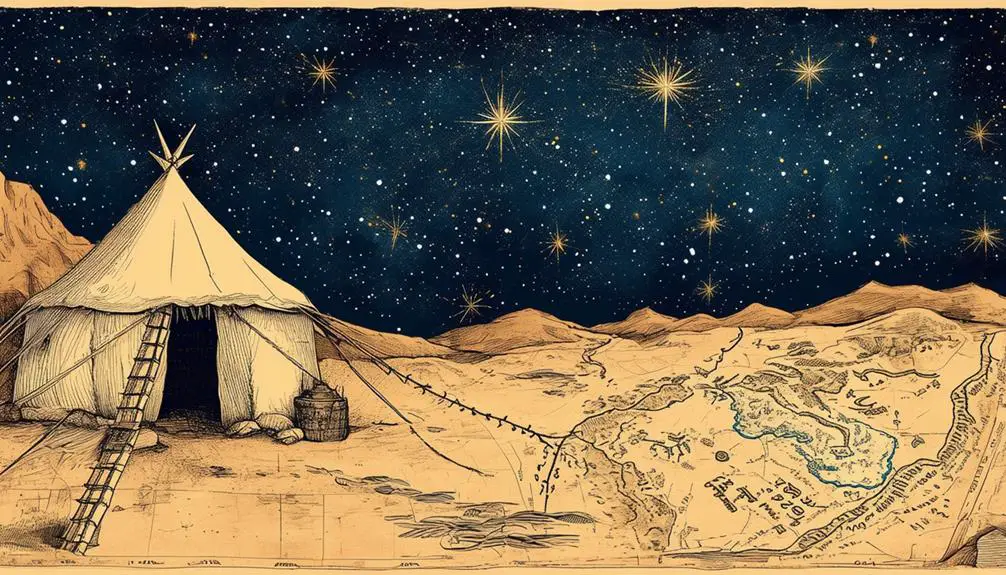Marvel at the mystical revelations in Genesis 28, where Jacob's dream and divine encounters prophesy his lineage's future and spiritual transformation.

Bible Study – The Book of Genesis – Chapter 28 – Summary and Analysis
In Genesis 28, you see Jacob guided by Isaac to marry within their lineage in Paddan-Aram. This chapter is packed with spiritual symbolism and divine promise as Jacob's famous ladder dream takes place. God's avowal to Jacob signifies profound implications for his destiny, that of his descendants, and the establishment of a homeland. The visible transformation in Jacob undeniably alters the course of his narrative. The intertwining themes of dreams, divine encounters, and blessings highlight the psychological and spiritual maturation of this patriarch. As you progress, the layers of this vivid narrative will be further revealed.
Key Takeaways
- Genesis 28 highlights Jacob's journey to Paddan-Aram, following Isaac's advice to avoid marrying a Canaanite woman.
- The chapter features Jacob's transformative dream of a ladder reaching heaven with angels ascending and descending, symbolizing divine communication.
- God promises Jacob a homeland, numerous descendants, and ongoing divine presence and protection, significantly shaping his destiny.
- Esau's resentment towards Jacob deepens, reflecting the continued familial conflict and tension within the patriarchal lineage.
- Jacob's spiritual growth is evident as he transitions from a cunning trickster to a humbled servant of God, influenced by his divine encounter.
Contextual Background of Genesis 28

To truly understand the intricacies of Genesis 28, you'll need to explore the historical and cultural context that shaped this pivotal chapter in the Bible. The first key dimension to examine is the significance of patriarchal lineage in the Ancient Society. The narratives of Genesis are deeply rooted in a culture where familial lineage, specifically the line of male heirs, was of utmost importance.
In such societies, the patriarchal lineage was not just a familial record, but a socio-political construct that determined everything from property rights to social standing. The narrative of Genesis 28, hence, cannot be fully grasped without understanding this underpinning structure.
The Ancient Society was also a world of tribal affiliations and alliances, where blessings, like the ones given by Isaac to Jacob, carried spiritual, social, and political weight. These blessings were not merely words, they were pivotal moments that shaped destinies and power structures.
Detailed Summary of Chapter 28
Delving into Genesis 28, you'll find it's a chapter steeped in profound spiritual symbolism and familial conflict. This chapter begins with Isaac instructing his son, Jacob, to not marry a Canaanite woman, instead directing him to Paddan-Aram, to take a wife from the daughters of Laban, his mother's brother. This directive sets in motion Jacob's journey, a significant narrative filled with emblematic spiritual undertones.
As Jacob sets out on his voyage, Esau, his brother, watches. Esau's resentment and bitterness towards Jacob for having taken his birthright and his father's blessing are palpable. In an attempt to appease his parents, Esau marries a woman from Ishmael's family, adding another layer to the ongoing tension.
Genesis 28 masterfully intertwines the human and divine, illuminating the struggles within a family and the spiritual development of an individual. It provides a closer look at the evolving dynamics between Jacob and Esau, underlining the impact of their actions on their future. Additionally, the chapter offers a glimpse into the spiritual transformation Jacob undergoes, setting the stage for subsequent events. However, the insights from Jacob's dream, a pivotal part of this transformation, are reserved for deeper exploration in the next segment.
Analyzing Jacob's Dream

Now, let's turn our focus to the significant event of Jacob's dream, a profound spiritual experience that fundamentally alters Jacob's understanding of himself and his place in the divine plan. This dream, featuring a ladder reaching to heaven with angels ascending and descending, is a pivotal point of divine communication. It brings about a paradigm shift in Jacob's perception, leading him to acknowledge the omnipresence of God.
In terms of dream interpretation, Jacob's dream is not merely a surreal nocturnal event but a symbolic message from the divine. The ladder signifies the connection between earth and heaven, the physical and the spiritual, the human and the divine. Angels, traditionally seen as messengers of God, ascending and descending underscores the ongoing interaction between the celestial and terrestrial domains.
Jacob's response to the dream is as significant as the dream itself. He recognizes the place as 'Bethel' or 'The House of God' suggesting an enlightened understanding of the divine presence everywhere, not just in specific holy places. This dream, then, is a transformative moment that redefines Jacob's worldview, setting him on a spiritual trajectory that shapes the course of his life and the lineage of Israel.
God's Promises and Their Implications
Examining God's promises to Jacob in this narrative, you'll see they're laden with profound implications, setting the stage for a seismic shift in the destiny of Jacob and his descendants. Here, Divine Commitments become the bedrock of a divine-human relationship, reshaping Jacob's personal journey and the broader narrative arc.
- God promises, "I will give you and your descendants the land on which you are lying." This lands the assurance of a physical homeland, a place of belonging and identity.
- The pledge, "Your descendants will be like the dust of the earth," signifies a promise of exponential familial growth, hinting at a multitude of nations and kings to come.
- The Divine commitment, "I am with you and will watch over you wherever you go," reaffirms God's unending presence and protection, fulfilling a spiritual covenant that transcends physical boundaries.
Each promise carries a weighty implication. Promise Fulfillment isn't merely a future event, but an ongoing process shaping Jacob's life and the lives of his descendants. As a result, it instills a sense of purpose and reassurance, catalyzing Jacob's transformation and the unfolding destiny of his lineage.
Reflections on Chapter 28's Themes

Reflecting on the themes of Chapter 28, you'll find that they echo the promises and implications previously discussed, further emphasizing the transformation of Jacob's destiny and the overarching narrative. This chapter's focus on dream interpretation and divine encounters takes us deeper into the psychological and spiritual development of Jacob as a patriarch.
Dream interpretation plays a pivotal role in understanding Jacob's experiences in this chapter. His dream of a ladder reaching heaven with angels ascending and descending symbolizes the connection between the earthly and divine worlds. This encounter highlights a significant theme: God's omnipresence. You'll notice that Jacob's understanding of God shifts from a mere abstract concept to a personal deity who interacts with humanity.
Furthermore, divine encounters, another central theme, transform Jacob from a cunning trickster to a humbled servant of God. His encounter at Bethel underscores the significance of divine intervention in shaping one's destiny. It also signifies the shift from a personal to a collective promise, as God's covenant with Abraham now extends to Jacob.
Frequently Asked Questions
What Is the Significance of the Place Name 'Bethel' in Genesis 28?
In Genesis 28, 'Bethel' holds deep significance. It's where you encounter divine revelations, making it a spiritual hot spot. Bethel's symbolism is deeply rooted in these divine encounters. Think of it as a portal to the divine, a place where heaven and earth meet. It's more than just a name, it's a spiritual landmark, a place of connection with the divine. So, the significance of 'Bethel' lies in its role as a conduit for divine encounters.
How Does Jacob's Dream Affect the Rest of His Life's Journey?
Jacob's dream in Genesis 28 profoundly impacts his life journey. You see, the dream's symbolism is a sign of divine intervention, marking a spiritual transformation in Jacob. It shapes his understanding of God's presence and guidance, instilling a sense of purpose. This revelation propels Jacob through life's challenges and triumphs, shaping him into a patriarch. It's a pivotal moment, fundamentally the catalyst for his destiny.
What Are Some Common Interpretations of the Ladder in Jacobs Dream?
Diving into dream symbolism, you'll find the ladder in Jacob's dream is often interpreted as a bridge between Earth and Heaven, symbolizing divine communication. Some believe it's a metaphor for the connection between God and humanity, with angels as messengers. Others think it signifies Jacob's spiritual growth and journey. It's also seen as a prophetic vision of Christ, the ultimate link between heaven and earth. Each interpretation offers deep insights into biblical symbolism.
What Is the Role of Angels in Genesis 28 and in the Wider Biblical Context?
In Genesis 28, angels act as divine messengers, linking heaven and earth. They're integral to the Angel Hierarchy, each serving specific Angelic Duties. In a broader biblical context, they're God's agents, executing divine plans. They deliver messages, provide protection, and enact judgment. They're not simply spiritual beings; they've a dynamic role in God's narrative, bridging the gap between the divine and human spheres.
How Does Jacob's Response to God's Promises Reflect His Spiritual Growth?
Jacob's faith is reflected in his response to God's promises, showing his spiritual growth. You see him accepting and believing God's word wholeheartedly, a proof of his strengthened faith. His actions, like setting up a stone pillar and vowing to give a tenth of his possessions to God, reveal his recognition of God's promise fulfillment. This moves him from a self-centered perspective to one that acknowledges and respects the divine.



Sign up